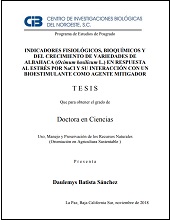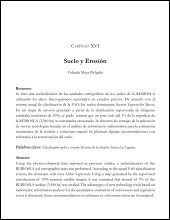INDICADORES FISIOLÓGICOS, BIOQUÍMICOS Y DEL CRECIMIENTO DE VARIEDADES DE ALBAHACA (Ocimum basilicum L.) EN RESPUESTA AL ESTRÉS POR NaCl Y SU INTERACCIÓN CON UN BIOESTIMULANTE COMO AGENTE MITIGADOR
Resumen
"Lograr establecer cultivos en condiciones adversas es unos de los mayores retos que enfrenta el hombre, entre los métodos más novedosos para conseguirlo se encuentran el uso de bioestimulantes naturales, ya que estos activan funciones fisiológicas en las que permiten mayor eficiencia metabólica, lo que constituye una opción para mitigar los efectos del estrés por salinidad. El presente trabajo de investigación estudió el efecto del biestimulante FitoMas-E® como mitigador del estrés por NaCl en la germinación, emergencia y crecimiento vegetativo de tres variedades de albahaca (Ocimum basilicum L.) con respuesta diferencial al estrés por NaCl. La investigación se realizó en condiciones de laboratorio e invernadero. Para las etapas de germinación y emergencia las semillas de las variedades Napoletano, Nufar y Emily se sometieron a concentraciones de NaCl (0, 50, 100 y 150 mM) y dosis de FitoMas-E® (0, 0.5, 1.0 y 1.5 mL L-1), en un diseño completamente al azar con arreglo factorial de cuatro repeticiones. Las variables evaluadas, porcentaje y tasa de germinación y emergencia, altura de la plántula, longitud de radícula, biomasa fresca y seca de la radícula y de parte aérea, evidenciaron una disminución significativa en condiciones de estrés por NaCl de moderado a severo. La longitud de raíz, altura de la plántula, biomasa seca de raíz y biomasa fresca de parte aérea en 150 mM de NaCl fueron las más afectadas. Se observó que cuando se aplicó FitoMas-E® las plantas incrementaron significativamente longitud de raíz, altura de planta y biomasa seca de raíz, lo que revela el efecto estimulante del FitoMas-E® siendo 0.5 mL L-1 la dosis estimulante. Para la etapa de crecimiento vegetativo se determinó el efecto del FitoMas-E® como atenuante del estrés por NaCl en las mismas variedades de albahaca en sistema hidropónico. Se empleó un diseño completamente al azar con arreglo factorial (3A×2B×4C), donde el factor A fueron las variedades, B las dosis de FitoMas-E® (0 y 0.5 mL L-1) y C las concentraciones de NaCl (0, 50, 100 y 150 mM), con cuatro repeticiones. Se evaluó biomasa fresca y seca de la parte aérea y raíz, longitud del tallo y raíz, diámetro del tallo, área foliar, tasa fotosintética, potencial hídrico, contenido relativo de agua, contenido de prolina, proteínas totales, superóxido dismutasa, catalasa, glutatión peroxidasa y contenido de aceites esenciales..." "The establishment of crops in adverse conditions is one of the greatest challenges facing man, among the most novel methods to achieve this are the use of natural biostimulants, since these activate physiological functions in which they allow greater metabolic efficiency, which constitutes an option to mitigate the effects of salinity stress. The present research study evaluated the effect of a biostimulant FitoMas-E® as a stress reliever for NaCl in the germination, emergence and vegetative growth of three varieties of basil (Ocimum basilicum L.) with different response to stress by NaCl. The research was conducted under laboratory and greenhouse conditions. For the germination and emergence stages, the seeds of the Napoletano, Nufar and Emily varieties were subjected to NaCl concentrations (0, 50, 100 and 150 mM) and doses of FitoMas-E® (0, 0.5, 1.0 and 1.5 mL L-1), in a completely random design with a factorial arrangement of four repetitions. The variables evaluated were, percentage and rate of germination and emergence, seedling height, radicle length, fresh and dry biomass of the radicle and aerial part, showed a significant decrease in conditions of stress by moderate to severe NaCl. Root length, seedling height, dry root biomass and fresh aerial biomass in 150 mM NaCl were the most affected. It was observed that when FitoMas-E® was applied, the plants significantly increased root length, plant height and dry root biomass, which reveals the stimulating effect of FitoMas-E® with 0.5 mL L-1 being the stimulating dose. In the vegetative growth stage, the effect of FitoMas-E® was determined as an attenuator of stress by NaCl in the same varieties of basil in the hydroponic system. A completely randomized design with factorial arrangement (3A × 2B × 4C) was used, where the factor A were the varieties, B the doses of FitoMas-E® (0 and 0.5 mL L-1) and C the NaCl concentrations (0, 50, 100 and 150 mM), with four repetitions. Fresh and dry biomass of the aerial part and root, stem and root length, stem diameter, leaf area, photosynthetic rate, water potential, relative water content, proline content, total proteins, superoxide dismutase, catalase, glutathione, peroxidase and content of essential oils were evaluated..."
Colecciones
Ítems relacionados
Mostrando ítems relacionados por Título, autor o materia.
-
PROMOCIÓN DEL PERIFITON PARA EL CULTIVO DE CAMARÓN BLANCO: HACIA UNA ACUICULTURA ECOLÓGICA
DOMENICO VOLTOLINA LOBINA; JUAN MANUEL AUDELO NARANJO; MARIA DEL ROSARIO PACHECO MARGES -
Suelo y Erosión
YOLANDA LOURDES MAYA DELGADO


